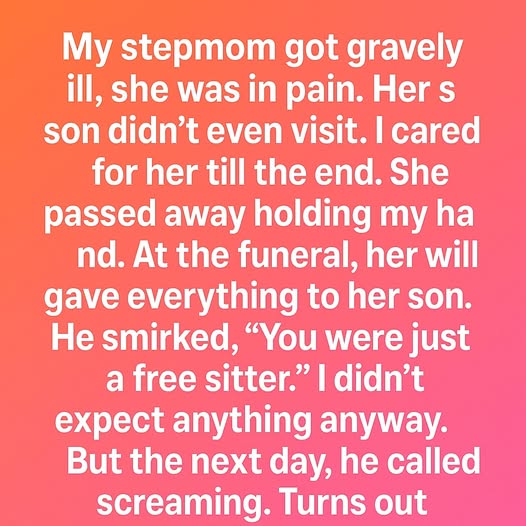The morning after the funeral, I expected quiet. Grief usually settles slowly, like dust—heavy and silent. Instead, chaos found me before breakfast. My phone rang incessantly, and even before I answered, I knew something had broken open overnight. On the line was her son, his voice a mix of anger, confusion, and a softer undertone—fear, perhaps. He kept repeating, “Why would she do this? Why would she write to you?”
It took me a moment to understand. While sorting through her belongings, he had discovered a letter tucked inside an old keepsake box by her bedside. It wasn’t for him. It wasn’t for the family. It had my name, written in her familiar looping handwriting.
I hadn’t expected anything—no gifts, no money, no recognition. I had been there for the last stretch of her life, helping with appointments, meals, and the long, quiet afternoons when her body felt heavy and her mind even heavier. I had been there because I wanted to, not for thanks or reward.
Still, knowing she left something for me sent a strange chill through my chest.
He read parts of the letter aloud, his voice shaking. She had written about her fear of being a burden, her gratitude for the quiet moments we shared, and how my presence made her feel less alone. She wished she could have changed her will to reflect the meaning of our bond but didn’t want conflict in her final days. The letter was her way of giving me something she felt she still owed—a truth, spoken plainly, with no expectations.
But that wasn’t what broke him.
In the same box, he found old notes and receipts—reminders of plans she had once made to set up a small trust in his name. It was never completed. Not because she didn’t care about him, but because her final months were spent trying to repair the growing distance between them. She wrote reminders to call him, drafts of conversations, apologies she thought she owed, questions she was too afraid to ask.
She had been trying, imperfectly, to reconnect.
Those unfinished plans struck him harder than the letter to me. He had expected money, acknowledgment—but what he found was regret. Evidence that she had spent her last months wishing for a closeness they had allowed to slip away.
It was easier for him to direct anger at me—at my presence during her final days—than to face the truth she had written in her own hand.
When he demanded answers, I didn’t raise my voice. I didn’t argue. I explained what I knew: the letter wasn’t meant to replace him or divide anything. It wasn’t a statement about worth or inheritance. It was simply her last attempt to say thank you to someone who had helped carry a burden she didn’t want him to see.
I told him what I had witnessed: she loved him deeply, even when she didn’t know how to show it. She spoke about him constantly. She wished things were different. She was proud of him, no matter how far life had pulled them apart.
There was nothing left to fight over in her estate—no money, property, or hidden accounts. All he had was a letter she wrote to me and a box of unfinished intentions.
What she left him wasn’t money—it was clarity. Hard, heavy, inconvenient clarity.
He was silent for a long time. The shouting stopped. Defensiveness drained from his voice. He wasn’t angry anymore; he was grieving something deeper than death—the time he hadn’t taken, the conversations he hadn’t had, the distance he let grow, thinking there would always be more chances.
We all make that mistake once.
After the call, I sat alone in the kitchen, finally enveloped in quiet. I realized the most valuable thing she left me wasn’t the letter—it was the reminder that kindness matters, even when unnoticed. That the moments we offer in someone’s hardest days can shape their memory of themselves. And sometimes, appreciation comes later, in the form of a handwritten note discovered only after we’re gone.
A few days later, he called again. Not yelling. Not defensive. Just tired, like someone who had spent the night sorting through more than cardboard boxes.
“I read the whole letter,” he said quietly. “I think I finally understand something.”
No accusation, just the ache of realization.
He asked to meet for coffee—not to revisit the past, but to try to understand each other, to honor the person we both cared about.
We met at a small café she loved. We talked about her laugh, her stubbornness, her habit of leaving notes everywhere. About the years he lost and the days I spent with her at the end. No bitterness—just two people sorting the emotional debris left behind.
Her letter didn’t divide us—it bridged what neither of us could fix alone.
He apologized. I accepted—not because I needed it, but because I understood the grief behind it: messy, raw, and slow to soften.
When we parted, we agreed on one thing: her last gift wasn’t about gratitude or regret. It was about connection—messy, imperfect, overdue. Her final wish, maybe, was that the people who mattered to her in different ways might find a way to understand each other too.
Some inheritances arrive in envelopes. Others arrive as truth revealed. Hers arrived in ink. His arrived in clarity. Mine arrived in peace.
And somehow, it was enough.
